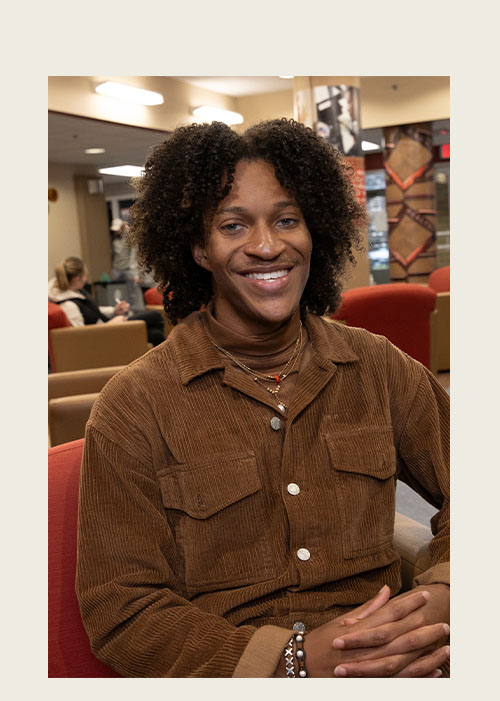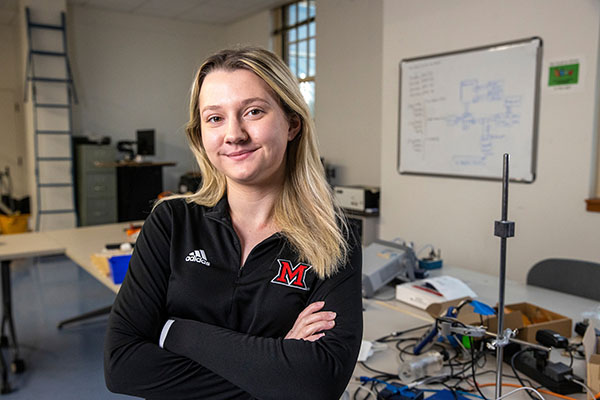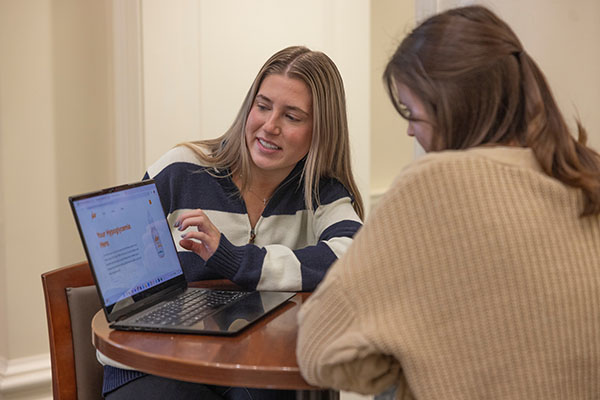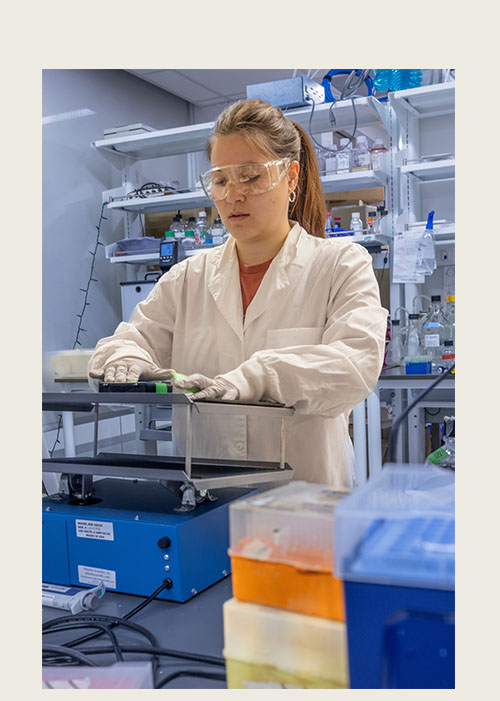Students give back with Honors College senior projects
From research to entrepreneurship, Miami students dive into the real-world applications of their passions
There’s no better place at Miami University to explore and investigate the unanswered questions of the world around us than the Honors College. Engaging learning experiences, faculty mentorship, and flexibility to design their own path means students can dive into the real-world applications of their passions. Senior projects, a new requirement in the Honors College this year, give students the opportunity to put this mindset into practice.
But a project to sum up four years of interdisciplinary learning? Where do you even begin?
“It's a project you're supposed to do at the end of your time here at Miami as an honors student,” said Zeb Baker, inaugural dean of the Honors College. “And it's a project that we really want to be an opportunity for you to kind of bring all of the elements of your learning as an honors student together within this particular project.”

Participants had the opportunity to choose not only what they focused on but the final form it took as well. Projects don’t have to be related to students’ majors as long as they synthesize what they learned during their time at Miami and examine the practical applications of their studies at the Honors College.
“Students have great flexibility to decide which route they want to take,” Baker said. “And also then what the nature of the project will be, because at the end of the day, they're the ones who are really designing the project, really pursuing it. It should be borne out of either their work or what they're passionate about.”
Kinesiology and Psychology student Nick Bertrand decided to combine his two majors into one passion project. He created a literature review, focusing on analyzing wellness practices that healthcare workers can use in their daily lives to avoid burnout and stress. What seemed like a daunting task to tackle at the beginning of the year became simple once he perfected the time management.
“I feel like I had a lot of ideas and a lot of things I wanted to do, and I really needed to plan (them) out before I just started putting words to the paper,” Bertrand said. “And once I was really able to get over that hurdle, everything kind of flowed through and it was able to be facilitated over my year very easily.”
In many students’ cases, senior projects complemented their other final coursework and the flexibility to choose any topic or medium made it easy to combine the two.

“The senior honors project was definitely not as much work as I thought it would be,” Freeman said. “I think part of the way you can kind of avoid making it daunting is if you work on it, like incrementally.”
She analyzed the state of sustainable energy on Miami’s campus and evaluated the economic feasibility of implementing solar power on campus as well as how to introduce it without disrupting Miami’s classic Georgian architecture.
“I think it’s really representative of the type of work engineers do in the real world,” Freeman said of her project. “I know it helped me work with lots of different types of people with different types of perspectives and backgrounds.”
That’s exactly the type of perspective Baker wants honors students to gain from their Miami experience.
“I think this becomes appealing to a future employer or to medical school, grad school, law school, because it's a tangible project that the student can point to (and) say, ‘I did this thing, I built it from start to finish,’” Baker said. “And then I have poured the full effect of my honor's education into this project. I think that's really what we were hoping students would be able to do with this.”

“The thing that I am definitely the most excited for is to actually get the product into the market and then get customer feedback,” Simeone said. “Because I truly believe that this is a product that could improve lives and really change a lot of diabetics for the better, help them improve their lives and just get through the low blood sugar levels easier and quicker.”
Adapting HERO into her project means Simeone has been able to use university resources like grant funding and mentorship to develop her business plan and figure out next steps. Right now she plans to work on her product full time after graduation and has even hired another Miami graduate to run her marketing and social media.
“The Honors College just gave me that step up to kind of make me take those next steps with the project and build it a little bit more,” Simeone said. “The thing that I'm probably most proud of is just the amount of growth that I've had, both as a person and that my company has had through me working on it. I've definitely got a lot tougher skin now.”

Her research, with faculty mentor Eileen Bridge, associate professor of Microbiology, looked at using protein from adenoviruses to halt that response in cells and sensitize cancer cells to treatment once more.
“When I first went into it, I had this idea in my mind that I was going to write, you know, a 20-page research thesis,” Wang said. “But as I got further along in my process, I realized that communication can come in a lot of forms. So instead of just writing that 20-page research paper, I wrote a popular press report that was supposed to mimic something you would see in The New York Times reporting about a scientific research article.”
Wang built two important real-world skills developing her project this way: how to communicate with patients without a background in science and how to handle a certain amount of trial and error in her work.
“I think the whole basis of research, especially undergraduate research, is to understand that failure is a part of that productive process and to not only get comfortable with failure, but to actually start enjoying it,” Wang said. “Because that failure is what allows you to go back and use critical thinking, use problem solving, understand the mechanisms of what you're doing and why it might have gone wrong.”
Encouraging critical and independent thought is a huge reason why Miami’s Honors College is so unique. Students don’t just check off another requirement to graduate with honors, their completed projects emphasize their love of learning and passion to contribute to their communities.
“Regardless of what you choose to do, knowing that you're making an impact, knowing that you're making the impact that you want to have on your community in whatever area or specificity or field that might be, makes it so much easier and makes it so much more rewarding,” Wang said.